Features
CONCLUSION Part ‘A’PASSIONS OF A GLOBAL HOTELIER
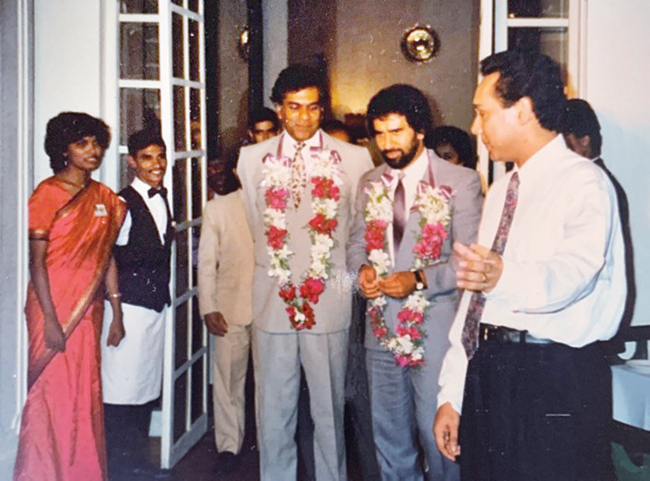
CONFESSIONS OF A GLOBAL GYPSY
Dr. Chandana (Chandi) Jayawardena DPhil
President – Chandi J. Associates Inc. Consulting, Canada
Founder & Administrator – Global Hospitality Forum
chandij@sympatico.ca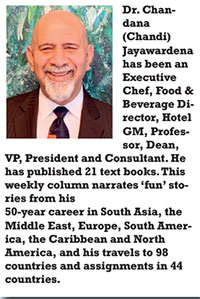
Thank You!
This 90th episode and next Sunday’s 91st episode provide the concluding narration of the ‘CONFESSIONS OF A GLOBAL GYPSY’ column. In addition, during the last 27 months, I published nine other special feature articles in the Sunday Island. Those were on topics such as: ‘My Princess of Hospitality’, ‘Tsunami’, ‘COVID-19’, ‘Baila King and I‘, a couple on ‘China’ and stories of famous people I hosted as a hotelier (President Castro, Prince Philip, Pelé.).
I thank you for reading these 100 articles. I enjoyed sharing my personal stories with you. My life is an open book and very soon ‘Confessions of a Global Gypsy’ will be published as a book. I wanted to write this book mainly for my three children, to keep a record of their father’s unusually action-packed life of his early career in hospitality operations and management.
Hospitality industry, by accident
Last 89 episodes of this column covered 18 years of my life, from age 17 to 35. My story started on April 5, 1971, the day an armed communist revolt was commenced by Janatha Vimukthi Peramuna (JVP) / People’s Liberation Front against the Government of Ceylon. I was 17-years old at that time and was a grade 12 student at Ananda College in Colombo 10. On that day my life and dreams for the future changed significantly.
Throughout my 13 years at the largest school in Ceylon (Ananda College), from kindergarten to grade 12, I was a very bad student. I did not read any assigned texts, and devoutly ignored homework assignments, in order to find time for fun and games. Therefore my teachers were surprised when I passed the Grade 10 Ordinary Level government examinations in my first attempt. I was good at sports and showed some leadership qualities, both at school and in the diverse community where my family lived – the Bambalapitiya Flats.
I was also a cadet and held the rank of Corporal in my scool platoon. My dream was to join the army as an officer cadet for a two-year training program when I turned 18. I was sad when my parents told me decisively that, “a career in the Army is now far too dangerous and we do not want our only son to die at war!” I was forced to choose another career.
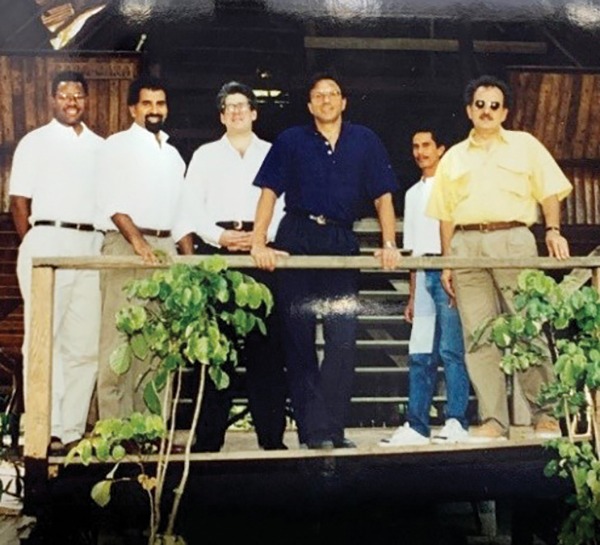
My parents had doubts that I would be successful at the Grade 12 Advance Level government examinations to enter a university and eventually become a doctor, an engineer or a lawyer (as preferred for their children by most parents in then Ceylon). They gave me three career choices and wanted me to pick one. My father provided some pros and cons for all three choices.
He said that, “Once the war ends, tourism has the potential of becoming a key, non-traditional industry in Ceylon. Those who earn a recognized qualification and join the industry at an early stage will have excellent opportunities. There is a Hotel School in Colombo, run by a European faculty, which offers a three-year diploma in Hotel and Catering Operations.”
As a frequent global traveller, my father had already inspired me to follow in his footsteps. He was suggesting that a career in tourism would provide me with opportunities to travel to different countries. Such opportunities were rare in developing countries at that time and not affordable to a vast majority of Lankans. As a free-spirited teenager, living in a hostel for three years and getting good ‘free’ food were also convincing and selling points from my father. I said, “OK, I will become a hotelier!” without fully realizing what that entailed.
After an unsteady start …
Soon after joining the Ceylon Hotel School, I focused on gaining industry experience at every possible opportunity. I started at the lowest ranks within the hospitality industry and did a record number of ten part-time jobs during the next three years. Although I was fired from my first job and nearly expelled by the West German Principal of the Ceylon Hotel School for bad behaviour, a few years later I concentrated on doing well in post-graduate studies in Sri Lanka and Europe. My father was correct when he predicted to my mother who was very worried about me, “Dulcie, don’t worry. Chandana is a late developer and eventually will do well.” Thank you, Thaththa!
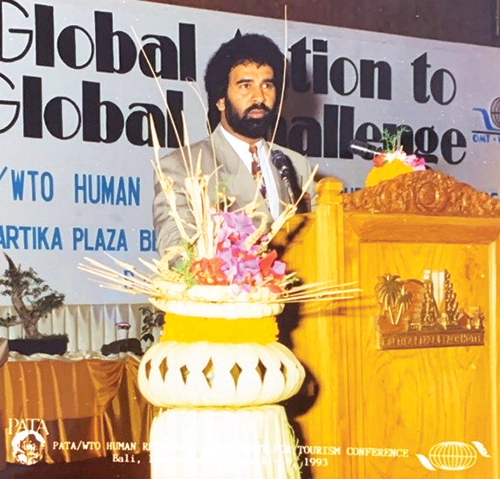
During the first 18 years of my adventurous career, I gained experience as a dishwasher, busboy, waiter, bellboy, roomboy, receptionist, barman, cook, assistant manager, trainee chef, executive chef, food & beverage manager, resort manager, and operations manager of John Keells Hotels Group, senior lecturer, tourist guide lecturer, travel agency director and general manager of two large resorts, and food and beverage director of a five-star, international hotel. By mid 1989, in the midst of two terrorist wars in Sri Lanka, I was ready to commence a global career in hotel management.
I continued in the tourism and hospitality industry for another 34 years in different capacities, mainly as a Hotel General Manager. I was a Professor and Dean and during the last 10 years, a Leadership Consultant. I am still involved in the hotel industry and academia, but as a coach to younger generations of hoteliers and hospitality professors, with the hope that they may benefit from some of my old stories and experiences.
I firmly believe that those who were fortunate to have colourful and unusually exciting careers have a responsibility to share their wealth of experience to help others. It is difficult to cover all of the experiences I have gained during my long career. Therefore, in the rest of the space I have in the two concluding articles of the ‘Confessions’ series, I will use more than the usual number of photographs to tell the story. As someone once said, “A picture is worth a thousand words.”
Dreams in Bombay
In May, 1989, I boarded a flight from Colombo to Bombay (re-named Mumbai six years later) with 50 former employees of Hotel Lanka Oberoi. I was the only outside recruit to join Hotel Babylon Oberoi in Iraq. As I was the only divisional head (Food & Beverage Manager) in the group of new recruits, I had to assume a leadership role during the journey and settling period in Baghdad. After a night in Bombay arranged by the Oberoi Hotels, we took a second flight to Baghdad. All 50 had some level of anxiety about working in a war-torn location with a totally different culture, but we were happy with the high salaries offered to us.
Before landing in Bombay, and the short stay in that colourful city, I wrote a one-page plan for my future. I was ambitious and keen to become the General Manager of an internationally branded hotel in a few years time. Having been a senior lecturer and trained by ILO/UNDP as a trainer, I also planned to return to the academia after completing a PhD. I had already submitted a proposal for a doctoral thesis to the University of Surrey in England, where I had completed a master’s degree in International Hotel Management four years prior. The last point I included in my hand-written plan, before we landed in Iraq, was that I eventually wanted to set up a consulting firm focusing on hospitality management. I already had done a few ad hoc consulting assignments and thoroughly enjoyed those opportunities.
Nightmares In Baghdad
I did well in Iraq, opening new restaurants and organizing a series of food festivals. I also trained many young Iraqis returning to civilian life after the eight-year long war with Iran. Although I found Iraqis to be very friendly, under the rule of Saddam Hussein, Baghdad was infested with ‘plain-clothed’ government spies closely watching every movement of the expatriate workers. No one knew who was spying on whom. My family (wife and son) were well looked after by Oberoi, with full-board accommodations in a corner suite overlooking the River Tigris. Every Friday (my off day) when we went out sightseeing and meeting with friends, on our return to the hotel we realised that someone had gone through all of our belongings and deliberately left clues that our suite had been searched.
Catering to the whims and fancies of the president’s murderous, elder son, Uday Hussein, in the hotel night club and casino was a scary challenge. A major culture shock for us was getting used to the fact that most men in Iraq openly carried firearms, and all our offices were wire tapped by secret police. In spite of these challenges, I focused on laying a good foundation for my global career, whilst working in Baghdad.
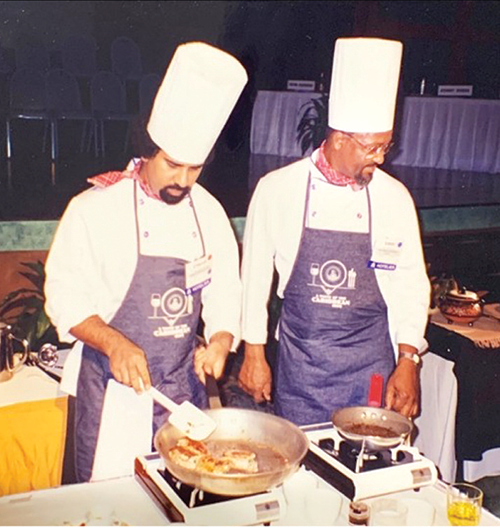
Back in London
When the University of Surrey accepted me to their MPhil/PhD program, we had a good reason to move from Iraq to England. Using our contacts in our most favourite city in the world, both my wife and I quickly found good jobs in London. I was appointed the Assistant Director (to my mentor, Professor Richard Kotas) of the School of Hotel Management at Schiller International University London Campus. In this American university I learnt a lot about the North American education system. I did three days of teaching in addition to my administrative duties and doctoral research. Later, I was promoted as the Acting Director, when Professor Kotas retired. We bought a house in London and planned to settle down in England. We were very comfortable there.
Visiting Professor in Luzern
Around the same time, I commenced doing teaching assignments as a Visiting Professor of the International Management Institute (IMI) in Switzerland. That experience prepared me for the various Visiting Professor roles I held in later years in Sri Lanka, Guyana, Canada, USA and the UK.
General Manager at Mount Lavinia
As I was doing well in academia and loved teaching, I commenced thinking that I should spend the rest of my career in post-secondary education. That plan changed when Mr. Sanath Ukwatte, Chairman of Mount Lavinia Hotel offered me an expatriate, three-year contract as the General Manager. As the benefits package was very good, it was another offer that I could not refuse. When I was leaving London, the Schiller International University offered me a teaching contract for the next three summers, which I accepted, as well.
In addition to being the General Manager of Mount Lavinia Hotel, I also managed the Catering Services for BMICH National Convention Centre of Sri Lanka, and set up another subsidiary, service company as the General Manager. Having worked there as a Trainee Waiter in 1972/1973, I was very happy to return as the General Manager after 18 years. I simply loved Mount Lavinia Hotel and did some innovative projects with its 700 employees.
Founding IHS as the Managing Director
I then conceptualized and opened the International Hotel School (IHS) of Sri Lanka within the Mount Lavinia Hotel, as the Founding Managing Director in 1991. It was a ‘Swiss-style’ functional hotel school, and the first of its kind in Sri Lanka. We secured five international accreditations/pathways for further education for IHS graduates in Europe and North America. IHS also launched Sri Lanka’s first Executive Diploma in Hotel Administration. In 2023 – the 32nd year of the school, I was appointed as a Director of IHS Guild.
The accreditation of IHS by the world’s largest professional body for hospitality managers – Hotel and Catering International Management Association (HCIMA) in the United Kingdom, opened many door for Sri Lankan hoteliers. IHS created the foundation to form the Sri Lanka Chapter (international group) of HCIMA. In 1991 I was elected as the Founding Chair of HCIMA – Sri Lanka.
IHS also led the establishment of Hotel Skills Improvement program of the Tourist Hotels Association of Sri Lanka (THASL). As the Chairman of this committee, I led the training of ‘On the Job Trainers’, with a team of top hospitality educators in Sri Lanka. It was an ambitious program, in spite of prolonging civil was in Sri Lanka continuing to affect tourism. It was considered a best practice in Asia and we were invited to share the concept at major regional conferences.
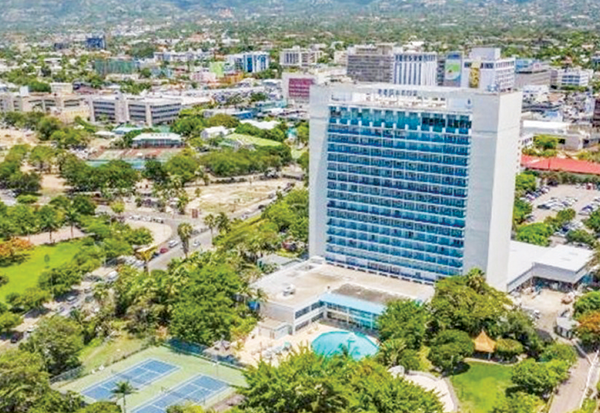
Setting up a Consulting Consortium
After I completed my three-year contract at Mount Lavinia Hotel, I had two career choices. I applied to all top international hotel corporations and indicated that I am looking for a General Manager position anywhere in the world. At the same time, I founded a consortium of hotel consultants in Sri Lanka. Our team of consultants which I led, included three other well-known Sri Lankan Hoteliers – Hiran Serasinghe (former General Manager of Ramada Renaissance), Damayantha Kuruppu (hotel equipment expert) and Kamal Happuwatte (hotel training expert and later, the Principal of the Ceylon Hotel School). While negotiating to take over two resort hotels for management, four of us did our own individual consulting assignments. Such a consortium was a new concept in Sri Lanka in 1994.
Consultant to the Chairman of Galle Face Hotel
From end of 1993, my main individual consulting assignment was at the Galle Face Hotel. I felt honoured, when the Chairman of the hotel company – the late Mr. Cyril Gardiner sought my advice as a Resident Consultant to further develop this world-famous iconic hotel established in 1864. I enjoyed working for this legendary businessman, and found it very interesting. A few months after I commenced my work at the hotel, when I was offered a General Manager post by the largest British hotel company – Forte PLC, Mr. Gardiner was very kind to release me from his assignment. “Don’t worry about leaving us so soon. Chandana, as a Sri Lankan hotelier, you have made me very proud!” he said.
General Manager in Guyana & the Amazon
In 1994, Forte PLC sent me to South America to manage two of their hotels – the only five-star hotel in the capital city of Guyana and an eco-resort in the Amazon Rainforest. In Guyana I set up a few new subsidiary companies, including a horse-riding school, and the first ever hotel school of Guyana where I was Principal. I also worked as a Visiting Professor of Tourism Marketing at the University of Guyana. I opened and curated an art gallery in the most prestigious venue in Guyana – at the lobby of the Guyana Pegasus Hotel.
Jamaica, the land I lLove…
My next assignment was to manage the largest hotel in the capital city of Jamaica. There, I had an amazing three years filled with exciting events, quality assurance initiatives, innovative training, and above all, joy of providing hospitality to over 100 celebrities. With my team, we won several prestigious awards – for food, events and eventually as the first ever hotel in North America to be awarded ISO 9002 in 1998.
After 1998, I left hotels to join academia again and to complete my doctoral studies. In 2007, I returned to hotel management briefly, when I opened the largest, five-star hotel in Guyana as the General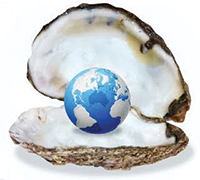 Manager, and Consultant to the government. There, with my team of consultants from Canada, I was responsible to train 300 hotel workers and host the Rio Summit which was attended by 18 heads of state. During my hotel career I served 35 heads of state/government.
Manager, and Consultant to the government. There, with my team of consultants from Canada, I was responsible to train 300 hotel workers and host the Rio Summit which was attended by 18 heads of state. During my hotel career I served 35 heads of state/government.
Having married a Jamaican, I consider Jamaica as my fourth home (after Sri Lanka, Canada, and the United Kingdom). Jamaica is very close to my heart.
… To be concluded next Sunday under the theme:
‘Missions of a Global Professor’ …
Features
The heart-friendly health minister

by Dr Gotabhya Ranasinghe
Senior Consultant Cardiologist
National Hospital Sri Lanka
When we sought a meeting with Hon Dr. Ramesh Pathirana, Minister of Health, he graciously cleared his busy schedule to accommodate us. Renowned for his attentive listening and deep understanding, Minister Pathirana is dedicated to advancing the health sector. His openness and transparency exemplify the qualities of an exemplary politician and minister.
Dr. Palitha Mahipala, the current Health Secretary, demonstrates both commendable enthusiasm and unwavering support. This combination of attributes makes him a highly compatible colleague for the esteemed Minister of Health.
Our discussion centered on a project that has been in the works for the past 30 years, one that no other minister had managed to advance.
Minister Pathirana, however, recognized the project’s significance and its potential to revolutionize care for heart patients.
The project involves the construction of a state-of-the-art facility at the premises of the National Hospital Colombo. The project’s location within the premises of the National Hospital underscores its importance and relevance to the healthcare infrastructure of the nation.
This facility will include a cardiology building and a tertiary care center, equipped with the latest technology to handle and treat all types of heart-related conditions and surgeries.
Securing funding was a major milestone for this initiative. Minister Pathirana successfully obtained approval for a $40 billion loan from the Asian Development Bank. With the funding in place, the foundation stone is scheduled to be laid in September this year, and construction will begin in January 2025.
This project guarantees a consistent and uninterrupted supply of stents and related medications for heart patients. As a result, patients will have timely access to essential medical supplies during their treatment and recovery. By securing these critical resources, the project aims to enhance patient outcomes, minimize treatment delays, and maintain the highest standards of cardiac care.
Upon its fruition, this monumental building will serve as a beacon of hope and healing, symbolizing the unwavering dedication to improving patient outcomes and fostering a healthier society.We anticipate a future marked by significant progress and positive outcomes in Sri Lanka’s cardiovascular treatment landscape within the foreseeable timeframe.
Features
A LOVING TRIBUTE TO JESUIT FR. ALOYSIUS PIERIS ON HIS 90th BIRTHDAY

by Fr. Emmanuel Fernando, OMI
Jesuit Fr. Aloysius Pieris (affectionately called Fr. Aloy) celebrated his 90th birthday on April 9, 2024 and I, as the editor of our Oblate Journal, THE MISSIONARY OBLATE had gone to press by that time. Immediately I decided to publish an article, appreciating the untiring selfless services he continues to offer for inter-Faith dialogue, the renewal of the Catholic Church, his concern for the poor and the suffering Sri Lankan masses and to me, the present writer.
It was in 1988, when I was appointed Director of the Oblate Scholastics at Ampitiya by the then Oblate Provincial Fr. Anselm Silva, that I came to know Fr. Aloy more closely. Knowing well his expertise in matters spiritual, theological, Indological and pastoral, and with the collaborative spirit of my companion-formators, our Oblate Scholastics were sent to Tulana, the Research and Encounter Centre, Kelaniya, of which he is the Founder-Director, for ‘exposure-programmes’ on matters spiritual, biblical, theological and pastoral. Some of these dimensions according to my view and that of my companion-formators, were not available at the National Seminary, Ampitiya.
Ever since that time, our Oblate formators/ accompaniers at the Oblate Scholasticate, Ampitiya , have continued to send our Oblate Scholastics to Tulana Centre for deepening their insights and convictions regarding matters needed to serve the people in today’s context. Fr. Aloy also had tried very enthusiastically with the Oblate team headed by Frs. Oswald Firth and Clement Waidyasekara to begin a Theologate, directed by the Religious Congregations in Sri Lanka, for the contextual formation/ accompaniment of their members. It should very well be a desired goal of the Leaders / Provincials of the Religious Congregations.
Besides being a formator/accompanier at the Oblate Scholasticate, I was entrusted also with the task of editing and publishing our Oblate journal, ‘The Missionary Oblate’. To maintain the quality of the journal I continue to depend on Fr. Aloy for his thought-provoking and stimulating articles on Biblical Spirituality, Biblical Theology and Ecclesiology. I am very grateful to him for his generous assistance. Of late, his writings on renewal of the Church, initiated by Pope St. John XX111 and continued by Pope Francis through the Synodal path, published in our Oblate journal, enable our readers to focus their attention also on the needed renewal in the Catholic Church in Sri Lanka. Fr. Aloy appreciated very much the Synodal path adopted by the Jesuit Pope Francis for the renewal of the Church, rooted very much on prayerful discernment. In my Religious and presbyteral life, Fr.Aloy continues to be my spiritual animator / guide and ongoing formator / acccompanier.
Fr. Aloysius Pieris, BA Hons (Lond), LPh (SHC, India), STL (PFT, Naples), PhD (SLU/VC), ThD (Tilburg), D.Ltt (KU), has been one of the eminent Asian theologians well recognized internationally and one who has lectured and held visiting chairs in many universities both in the West and in the East. Many members of Religious Congregations from Asian countries have benefited from his lectures and guidance in the East Asian Pastoral Institute (EAPI) in Manila, Philippines. He had been a Theologian consulted by the Federation of Asian Bishops’ Conferences for many years. During his professorship at the Gregorian University in Rome, he was called to be a member of a special group of advisers on other religions consulted by Pope Paul VI.
Fr. Aloy is the author of more than 30 books and well over 500 Research Papers. Some of his books and articles have been translated and published in several countries. Among those books, one can find the following: 1) The Genesis of an Asian Theology of Liberation (An Autobiographical Excursus on the Art of Theologising in Asia, 2) An Asian Theology of Liberation, 3) Providential Timeliness of Vatican 11 (a long-overdue halt to a scandalous millennium, 4) Give Vatican 11 a chance, 5) Leadership in the Church, 6) Relishing our faith in working for justice (Themes for study and discussion), 7) A Message meant mainly, not exclusively for Jesuits (Background information necessary for helping Francis renew the Church), 8) Lent in Lanka (Reflections and Resolutions, 9) Love meets wisdom (A Christian Experience of Buddhism, 10) Fire and Water 11) God’s Reign for God’s poor, 12) Our Unhiddden Agenda (How we Jesuits work, pray and form our men). He is also the Editor of two journals, Vagdevi, Journal of Religious Reflection and Dialogue, New Series.
Fr. Aloy has a BA in Pali and Sanskrit from the University of London and a Ph.D in Buddhist Philosophy from the University of Sri Lankan, Vidyodaya Campus. On Nov. 23, 2019, he was awarded the prestigious honorary Doctorate of Literature (D.Litt) by the Chancellor of the University of Kelaniya, the Most Venerable Welamitiyawe Dharmakirthi Sri Kusala Dhamma Thera.
Fr. Aloy continues to be a promoter of Gospel values and virtues. Justice as a constitutive dimension of love and social concern for the downtrodden masses are very much noted in his life and work. He had very much appreciated the commitment of the late Fr. Joseph (Joe) Fernando, the National Director of the Social and Economic Centre (SEDEC) for the poor.
In Sri Lanka, a few religious Congregations – the Good Shepherd Sisters, the Christian Brothers, the Marist Brothers and the Oblates – have invited him to animate their members especially during their Provincial Congresses, Chapters and International Conferences. The mainline Christian Churches also have sought his advice and followed his seminars. I, for one, regret very much, that the Sri Lankan authorities of the Catholic Church –today’s Hierarchy—- have not sought Fr.
Aloy’s expertise for the renewal of the Catholic Church in Sri Lanka and thus have not benefited from the immense store of wisdom and insight that he can offer to our local Church while the Sri Lankan bishops who governed the Catholic church in the immediate aftermath of the Second Vatican Council (Edmund Fernando OMI, Anthony de Saram, Leo Nanayakkara OSB, Frank Marcus Fernando, Paul Perera,) visited him and consulted him on many matters. Among the Tamil Bishops, Bishop Rayappu Joseph was keeping close contact with him and Bishop J. Deogupillai hosted him and his team visiting him after the horrible Black July massacre of Tamils.
Features
A fairy tale, success or debacle

Sri Lanka-Singapore Free Trade Agreement
By Gomi Senadhira
senadhiragomi@gmail.com
“You might tell fairy tales, but the progress of a country cannot be achieved through such narratives. A country cannot be developed by making false promises. The country moved backward because of the electoral promises made by political parties throughout time. We have witnessed that the ultimate result of this is the country becoming bankrupt. Unfortunately, many segments of the population have not come to realize this yet.” – President Ranil Wickremesinghe, 2024 Budget speech
Any Sri Lankan would agree with the above words of President Wickremesinghe on the false promises our politicians and officials make and the fairy tales they narrate which bankrupted this country. So, to understand this, let’s look at one such fairy tale with lots of false promises; Ranil Wickremesinghe’s greatest achievement in the area of international trade and investment promotion during the Yahapalana period, Sri Lanka-Singapore Free Trade Agreement (SLSFTA).
It is appropriate and timely to do it now as Finance Minister Wickremesinghe has just presented to parliament a bill on the National Policy on Economic Transformation which includes the establishment of an Office for International Trade and the Sri Lanka Institute of Economics and International Trade.
Was SLSFTA a “Cleverly negotiated Free Trade Agreement” as stated by the (former) Minister of Development Strategies and International Trade Malik Samarawickrama during the Parliamentary Debate on the SLSFTA in July 2018, or a colossal blunder covered up with lies, false promises, and fairy tales? After SLSFTA was signed there were a number of fairy tales published on this agreement by the Ministry of Development Strategies and International, Institute of Policy Studies, and others.
However, for this article, I would like to limit my comments to the speech by Minister Samarawickrama during the Parliamentary Debate, and the two most important areas in the agreement which were covered up with lies, fairy tales, and false promises, namely: revenue loss for Sri Lanka and Investment from Singapore. On the other important area, “Waste products dumping” I do not want to comment here as I have written extensively on the issue.
1. The revenue loss
During the Parliamentary Debate in July 2018, Minister Samarawickrama stated “…. let me reiterate that this FTA with Singapore has been very cleverly negotiated by us…. The liberalisation programme under this FTA has been carefully designed to have the least impact on domestic industry and revenue collection. We have included all revenue sensitive items in the negative list of items which will not be subject to removal of tariff. Therefore, 97.8% revenue from Customs duty is protected. Our tariff liberalisation will take place over a period of 12-15 years! In fact, the revenue earned through tariffs on goods imported from Singapore last year was Rs. 35 billion.
The revenue loss for over the next 15 years due to the FTA is only Rs. 733 million– which when annualised, on average, is just Rs. 51 million. That is just 0.14% per year! So anyone who claims the Singapore FTA causes revenue loss to the Government cannot do basic arithmetic! Mr. Speaker, in conclusion, I call on my fellow members of this House – don’t mislead the public with baseless criticism that is not grounded in facts. Don’t look at petty politics and use these issues for your own political survival.”
I was surprised to read the minister’s speech because an article published in January 2018 in “The Straits Times“, based on information released by the Singaporean Negotiators stated, “…. With the FTA, tariff savings for Singapore exports are estimated to hit $10 million annually“.
As the annual tariff savings (that is the revenue loss for Sri Lanka) calculated by the Singaporean Negotiators, Singaporean $ 10 million (Sri Lankan rupees 1,200 million in 2018) was way above the rupees’ 733 million revenue loss for 15 years estimated by the Sri Lankan negotiators, it was clear to any observer that one of the parties to the agreement had not done the basic arithmetic!
Six years later, according to a report published by “The Morning” newspaper, speaking at the Committee on Public Finance (COPF) on 7th May 2024, Mr Samarawickrama’s chief trade negotiator K.J. Weerasinghehad had admitted “…. that forecasted revenue loss for the Government of Sri Lanka through the Singapore FTA is Rs. 450 million in 2023 and Rs. 1.3 billion in 2024.”
If these numbers are correct, as tariff liberalisation under the SLSFTA has just started, we will pass Rs 2 billion very soon. Then, the question is how Sri Lanka’s trade negotiators made such a colossal blunder. Didn’t they do their basic arithmetic? If they didn’t know how to do basic arithmetic they should have at least done their basic readings. For example, the headline of the article published in The Straits Times in January 2018 was “Singapore, Sri Lanka sign FTA, annual savings of $10m expected”.
Anyway, as Sri Lanka’s chief negotiator reiterated at the COPF meeting that “…. since 99% of the tariffs in Singapore have zero rates of duty, Sri Lanka has agreed on 80% tariff liberalisation over a period of 15 years while expecting Singapore investments to address the imbalance in trade,” let’s turn towards investment.
Investment from Singapore
In July 2018, speaking during the Parliamentary Debate on the FTA this is what Minister Malik Samarawickrama stated on investment from Singapore, “Already, thanks to this FTA, in just the past two-and-a-half months since the agreement came into effect we have received a proposal from Singapore for investment amounting to $ 14.8 billion in an oil refinery for export of petroleum products. In addition, we have proposals for a steel manufacturing plant for exports ($ 1 billion investment), flour milling plant ($ 50 million), sugar refinery ($ 200 million). This adds up to more than $ 16.05 billion in the pipeline on these projects alone.
And all of these projects will create thousands of more jobs for our people. In principle approval has already been granted by the BOI and the investors are awaiting the release of land the environmental approvals to commence the project.
I request the Opposition and those with vested interests to change their narrow-minded thinking and join us to develop our country. We must always look at what is best for the whole community, not just the few who may oppose. We owe it to our people to courageously take decisions that will change their lives for the better.”
According to the media report I quoted earlier, speaking at the Committee on Public Finance (COPF) Chief Negotiator Weerasinghe has admitted that Sri Lanka was not happy with overall Singapore investments that have come in the past few years in return for the trade liberalisation under the Singapore-Sri Lanka Free Trade Agreement. He has added that between 2021 and 2023 the total investment from Singapore had been around $162 million!
What happened to those projects worth $16 billion negotiated, thanks to the SLSFTA, in just the two-and-a-half months after the agreement came into effect and approved by the BOI? I do not know about the steel manufacturing plant for exports ($ 1 billion investment), flour milling plant ($ 50 million) and sugar refinery ($ 200 million).
However, story of the multibillion-dollar investment in the Petroleum Refinery unfolded in a manner that would qualify it as the best fairy tale with false promises presented by our politicians and the officials, prior to 2019 elections.
Though many Sri Lankans got to know, through the media which repeatedly highlighted a plethora of issues surrounding the project and the questionable credentials of the Singaporean investor, the construction work on the Mirrijiwela Oil Refinery along with the cement factory began on the24th of March 2019 with a bang and Minister Ranil Wickremesinghe and his ministers along with the foreign and local dignitaries laid the foundation stones.
That was few months before the 2019 Presidential elections. Inaugurating the construction work Prime Minister Ranil Wickremesinghe said the projects will create thousands of job opportunities in the area and surrounding districts.
The oil refinery, which was to be built over 200 acres of land, with the capacity to refine 200,000 barrels of crude oil per day, was to generate US$7 billion of exports and create 1,500 direct and 3,000 indirect jobs. The construction of the refinery was to be completed in 44 months. Four years later, in August 2023 the Cabinet of Ministers approved the proposal presented by President Ranil Wickremesinghe to cancel the agreement with the investors of the refinery as the project has not been implemented! Can they explain to the country how much money was wasted to produce that fairy tale?
It is obvious that the President, ministers, and officials had made huge blunders and had deliberately misled the public and the parliament on the revenue loss and potential investment from SLSFTA with fairy tales and false promises.
As the president himself said, a country cannot be developed by making false promises or with fairy tales and these false promises and fairy tales had bankrupted the country. “Unfortunately, many segments of the population have not come to realize this yet”.
(The writer, a specialist and an activist on trade and development issues . )












